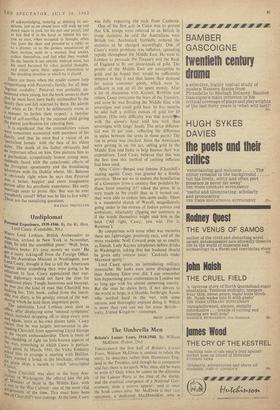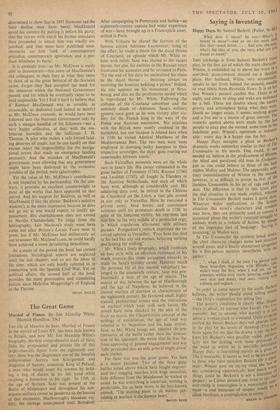The Umbrella Men
Britain's Locust Years, 1918-1940. By William McElwee. (Faber, 25s.) THROUGHOUT the first half of Britain's Locust Years, William McElwee is content to relate the story; he describes rather than illuminates Eng- land in the Twenties, and though he is competent and fair, there is no spark. Why, then, did he want to write it? Only when he comes to the dilemma of the Labour Party at the time of the slump. and the eventual emergence of a National Gov- ernment, does a motive appear: and at once the book comes alive. Mr. McElwee is that rare specimen, a dedicated MacDonaldite. who is
determined to show that in 1931 (however sad the later decline may have been) MacDonald saved his country by putting it before his party; that the venom with which his former associates then proceeded to attack him was wholly un- justified; and that most later published com- mentaries on him 'reek of contemporary prejudice, contemporary ignorance, and a par- tisan blindness to facts.'
It is certainly true—as Mr. McElwee is easily able to demonstrate—that some of MacDonald's old colleagues, in their fury at what they came to think of as the great betrayal of the Socialist cause, forgot they had accepted the need for the measures which the National Government passed, and for which he eventually came to be held responsible. Yet I find it hard to believe that if Ramsay MacDonald was as sensible, as reasonable, as dedicated (and indeed as saintly) as Mr. McElwee contends, he would have been followed into the National Government only by such a meagre handful of his followers—not a very happy collection, at that, with the em- bittered Snowden and the ludicrous J. H. Thomas. A pilot who makes a safe forced land- ing deserves all credit; but he can hardly on that excuse reject the responsibility for the naviga- tional errors that made an emergency landing necessary. And the mistakes of MacDonald's government, even allowing that any government might have been destroyed by the economic troubles of the period, were catastrophic.
Yet the value of Mr. McElwee's contribution is not impaired by his partisanship. On the con- trary, it provides an excellent counterweight to most of the works that have appeared on that period. And his support for Baldwin, as well as MacDonald (I like the phrase `Baldwin's sedative wisdom'), is the more impressive because he does not go on, as one would expect, to justify ap- peasement. His charitableness does not extend to Neville Chamberlain. To judge from the
bibliography, lain Macleod's study must have come out after Britain's Locust Years went to press; but if Mr. McElwee had deliberately set out to answer Mr. Macleod's case, he could hardly have achieved a more devastating demolition. As a study of the period the book has certain limitations. Sociological aspects are neglected
until the last chapter; and so are the ideas of the time, which are only briefly referred to in connection with the Spanish Civil War. Yet on political affairs, the second half of the book provides the most provocative and stimulating picture since Malcolm Muggeridge's of England in the Thirties.
BRIAN INGLIS



































 Previous page
Previous page